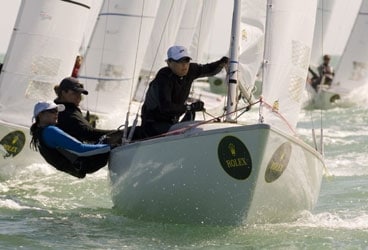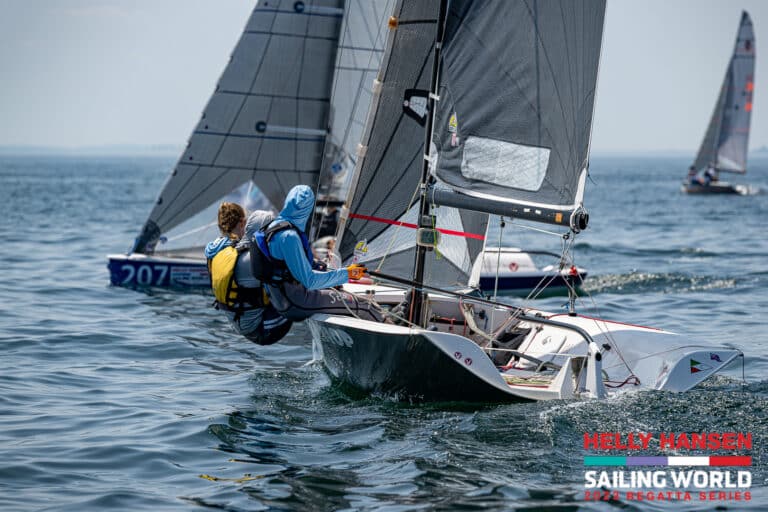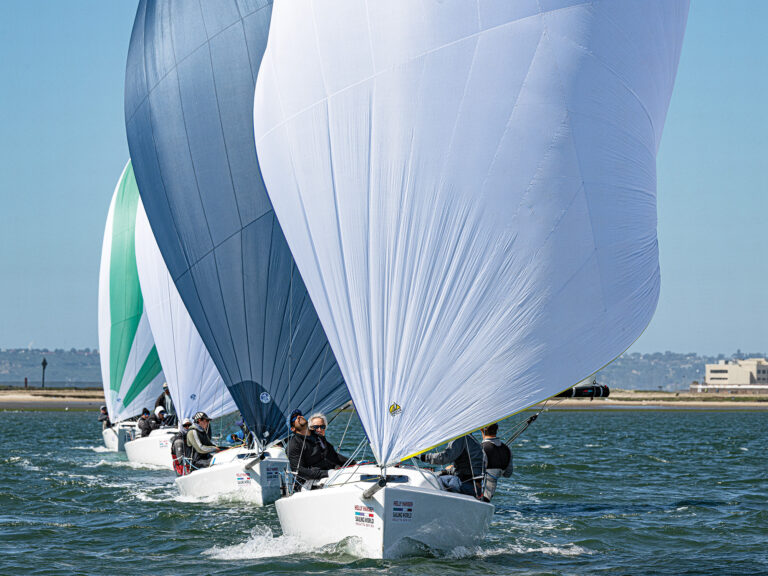
FirstBeatBarkowSt
Three years running, Sally Barkow, Debbie Capozzi, and Carrie Howe have won the Yngling class at the Rolex Miami OCR. But each victory has been vastly different. The first, in 2005, was over a small field of eight boats, a number of which were sailed by veteran female sailors taking a Yngling campaign out for a test drive. In 2006, Barkow and company demolished a much larger and more competitive field, accumulating less than a third of the points of the second-placed boat. This year, though the number of U.S. teams has dropped from four in the previous two years to just two, the field was again larger and deeper. It was a hotly contested regatta, with a number of teams taking the lead at various points in the six-day event. In the end though, the result was the same, Barkow, Capozzi, and Howe standing on the top step of the podium to receive the top prize. Olympic-class sailors seem to be perpetually surrounded by the sounds of an Olympic campaign–sails, boats, people–but when Sally Barkow answered my telephone call on Monday morning, two days after her victory, I didn’t hear any background noise. Barkow laughed when I pointed out the absence. It’s a day off, she said. Then added that she and her teammates planned on spending it inside for a change.Tell us a little about your win. It wasn’t much like the previous two was it?The previous two, I guess we sailed better at the beginning and that made it easy for us at the end. This one we sort of struggled at the beginning. We hadn’t raced since China [Pre-Olympic event in August] and we needed a little time to put our race management skills on the table, but it made for an exciting end of the event, which is good because it puts different pressure on you. Plus, I think everyone else is getting more ramped up. Everybody else’s game is rising, so it’s good to try to stay one step ahead.So the results being so much tighter than last year isn’t a sign you’re slowing down? I think everybody else is sailing better, but a little bit of it is us being out of touch with the racecourse. Those two in combination made that happen.How would you rate the quality of this fleet? Was it on par with a world championship?I think it was close. We were only missing a few of the top players, and from what I know about them, they probably weren’t in a position to be top players here anyway. I think we had 17 boats, and we saw a lot of really good competition. You mentioned not being racecourse sharp early in the event, which is to be expected if you haven’t raced in a while. Was that by design?I think it’s part of our bigger picture. We spent a lot of time sailing before the event, just not a lot of time racing. Now, in our big picture of our campaign, we’ve done a lot of homework with our development; that’s what we’ve been working on the past couple of months. Now we’re turning toward the racecourse side of things. We felt really confident at this event with our set up and our sails all the way around the course, in all conditions. We’ve put that effort in. And that was on purpose, because we have to do that before we can do the racecourse thing.You’ve been at this campaign for three years now, with few breaks. How’s your enthusiasm level, especially for the more mundane aspects like practicing?Now that some of our Trials are happening this July, I think we’re more fired up than we were three years ago. We had a lull time during the past year, when we didn’t know when the right time was to fire it up. But now it’s really clear; it’s only five months until we’re at our Trials regatta. You can feel the energy of the team elevate.You mention the Trials. The Yngling Trials are going to be a bit different this year. Can you explain the changes?Since we don’t have too many Ynglings in the U.S. competing, they’ve switched to a two-event trials. The first event is our worlds in Portugal in July, and the next event is the Miami Worlds in February of 2008. Unless any other U.S. team shows up, it’ll be Carol Cronin [2004 Olympic skipper in the Yngling] and her team versus ours. It’s a little tricky because these are the two events that you can qualify your country in as well.How will the scoring work for the two events?It’s [based on your] place. If you’re five places ahead of the other team [in the overall standings] then that 5 points carries over.The Yngling has undergone a tremendous amount of development since being named an Olympic class in 2000. Are people getting a handle on the fastest way to rig and sail the boat?People have more of a handle on it than we’ve seen in the past couple of years, but it’s still a big battle for us. There’s so much development that can be done, it’s a matter of prioritizing [what you want to focus on]. We’ve been focusing on sails, and just getting other pieces of equipment that we’re happy with.Are the sails you develop available to other teams, or is it an exclusive situation?No, there’s no real contract for that. We just try to keep moving the game along. We use Doyle sails at the moment and there’s nothing that says someone can’t get any sail that we sail with. But they won’t have the background of your experience, will they?We know what we’ve changed and why we’ve changed it. That might be confusing to other teams. The other thing about the Yngling is between North and Doyle, you have some dramatic differences between the sails. It’s pretty hard to duplicate exactly what each team is doing.Is one company better than the other in certain conditions?One thing that we learned this past year: we thought that in a place like China we would have to be very specific with our sails, but we didn’t have to be specific. In fact, we had to be very general and fast in all conditions.It was a pressure-packed medal race this year. You were in last at one point. Are you getting used to this format?We’re slowly getting used to it. We learned last year how to prepare for [medal races] in terms of strategy and game plan. We’ve been in a few, so it was pretty comfortable [in Miami] to go out and stick with our plan and execute. Some other teams don’t have the same experience, the same background. Everything we’re good at, we are able to bring into that medal race. This year there was a lot more pressure than last year, and I was really happy with how we dealt with it, took it in stride. There were a lot of spectator boats, a lot of hype. It’s good for the sport, but it’s hard for the sailors. It’s another challenge to work around.You have the North Americans at the end of this week in Miami. Where does your plan lead you from there?Our schedule goes this event and then we do some training, then were in Palma, and we have three Grade 1 events before the worlds. When we’re racing, we’re trying to improve our racing skills. In between, we’re checking back in with our set up. We’ll spend some significant time in Portugal just getting comfortable with the breeze. Five months sounds like a long time, but it’s really short in our minds, so it’s really exciting for us.









